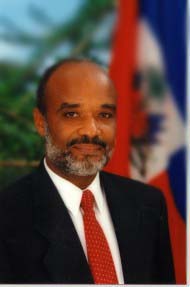Rene Preval named president to prevent bloodshed in Haiti
The popular leader is a former collaborator of deposed leader Jean Bertrand Aristide

Amid dennounces of fraud, massive protests and crossed accusations among political leaders, Rene Preval was proclaimed president of Haiti on Wednesday thanks to a political deal brokered by the UN peacekeeping mission lead by Brazil. Preval, a one-time political ally of deposed president Jean Bertrand Aristide and himself a former president of his country from 1996 to 2001, obtained 51 percent of the vote according to the country’s Provisional Electoral Council.
Preval is known as “champion of the poor majority” of this embattled Caribbean nation. He has opposed to the same wealthy elite who helped US plans to drive Aristide from power two years ago. In declarations to the local press, Preval said that "massive fraud" in the February 7 election had deprived him of a first-round victory in Haiti, one of the world's poorest countries.
"We have won. Now we are going to fight for parliament," Preval told the Haitian Press Agency. Jubilant supporters poured into the streets of Port-au-Prince, dancing and chanting "victory, victory," after the embattled Provisional Electoral Council issued a statement on Haitian radio in the middle of the night.
Preval’s political record includes some stunning successes. The 63-year-old leader is the only president in Haiti's 202-year history to win a democratic election, serve a full term and peacefully hand power to a successor.
A deal to prevent violence
The first presidential elections in Haiti since a US-backed plot ousted democratically elected president Jean Bertrand Arisitide in February 2004 took place in Haiti last week. On Tuesday millions lined for hours to vote for one of the 33 candidates, but clearly, the poor majority went for Preval.
The election day ended with five kiled in confusing episodes at the gates of the polling stations. First countings gave Preval a clear victory with over 60 percent of the vote, which allowed him to win the elections without runoff.
During the weekend, the Electoral Council suspended counting and when resumed, Preval’s votes dropped to less than 50 percent, whjich forced a second round. Amid fraud dennounces, tens of thousands supporters filled the streets in Port-Au-Prince, and other cities to claim Preval’s victory.
To avoid an stalemate and prevent a bloodshed Brazil, which heads a peacekeeping force of 9,000 U.N. troops and police, brokered the deal to distribute 85,000 "blank" votes, which showed no choice for president out of the 33 candidates, proportionately among the contenders. The blanks, amounting to 4.7 percent of the total, had been included in accordance with the law and reduced the final percentage allocated to each candidate.
With 90 percent of the ballots counted, Preval had been at 48.7 percent The agreement over the blank votes lifted Preval's share to 50.9 percent.
Now, Preval has been named president, but challenges for him have just begun. He will have to deal with a country devastated by decades of dictatorship, political instability, corruption, iliteracy and lack of economical horizons. All in all, he will have to deal with the poorest country in the Western hemisphere.
Hernan Etchaleco
Subscribe to Pravda.Ru Telegram channel, Facebook, RSS!




